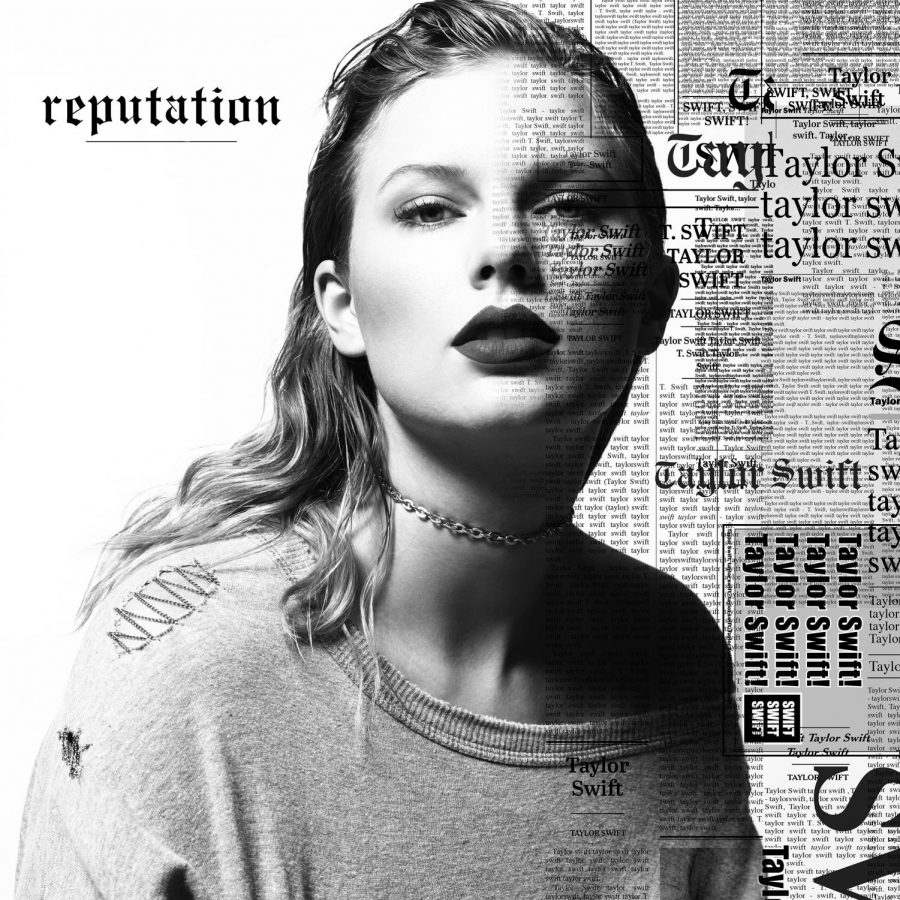Self-aware and melodramatic masterpiece “Reputation” proves Swift is in on the joke
Taylor Swift, following the monstrous success of her fifth album, “1989,” intentionally disappeared from the public eye. Now coming out of hibernation, Swift’s new masterpiece “Reputation” unshrouds her industrial synth-pop wonderland, redefining her artistry and personal narrative.
“Reputation’s” sonic pallet, for those familiar with her previous music, sounds like a mix of “Bad Blood’s” trap with “I Knew You Were Trouble’s” dubstep. “Reputation” is dark, atmospheric and thoroughly electronic.
The album’s lyrical content centers around two themes, love and revenge. While Swift’s lyrics are good, they are by no means her best work. “Reputation’s” libretto grows reductive and repetitive throughout the album’s 55-minute listen. By the album’s closing track, “Reputation” seems to have cycled through not only the same lyrics, but production.
Regardless, the album does host some incredible highlights. “I Did Something Bad” is a manic adrenaline rush, perfect for gearing up for an exercise, followed by “Don’t Blame Me,” a soulful ode to Swift’s love that best demonstrates her vocal and melodic talents. The third member of the trifecta, “Delicate,” is a hauntingly beautiful song that stands out upon first listen. These three tracks, coincidently in a row on the tracklist, are great candidates for future singles.
The worst songs on “Reputation” rely too heavily on production, and in doing so, lose touch with Swift’s unique voice, specifically the noisy “King of My Heart” and Chainsmokers-esque “Dancing With Our Hands Tied.”
Diving into electronic pop, Swift successfully rede- fines herself as an artist on “Reputation.” But behind the album’s blaring synths and piercing hi-hats lies the “Old Taylor” Swift infamously denounced on lead single “Look What You Made Me Do.” She may don a shield of trendy synthesizers, but the “Old Taylor” is far from “dead.” Swift’s personal narrative is expanding upon, not stomping on, her previous one, outgrowing her teenage heartbreak and settling into mature love. This personal evolution glows on “Reputation.”
The album reminds me of a rainy day. After a few lightning strikes near the beginning of the album, Swift settles into the storm, finding comfort and contentment in her shelter. The darkness of the production casts a cozy shadow over Swift’s romance, effectively contrasting “1989’s” ultraviolet pop.
While “Reputation” isn’t consistently and objectively great like “1989,” it has some undeniable highs that ultimately overshadow its mediocre lows. Swift took
a violent stab at the 2017 music scene, and “Reputation” hits the jugular, solidifying her place among pop’s superstars as a multi-talented, multi-faceted artist.
“Reputation:” ★★★★
Swift’s new album, “Reputation,” doesn’t ‘belong with me’
Swift’s sixth album “Reputation” doesn’t meet expectations. The album isn’t nearly as interest- ing or impressive as Swift’s previous albums, “1989” or “Speak Now.” The songs on “Reputation” poorly redefine Swift’s artistry by crafting her music with overproduction and uninspired lyrics. Throughout the album, Swift’s music sounds defensive, mechanic and emphasizes the beats over her voice.
The album does, however, diversify Swift’s catalogue, with each song providing new perspectives and attitudes towards Swift’s personal and romantic narrative.
“Gorgeous,” “Don’t Blame Me” and “I Did Something Bad” are catchy songs that avoid sounding annoying, but “Gorgeous” required repeated listens to fully digest and appreciate.
Upon listening to the album, “Don’t Blame Me” sounds like it has the most potential to be a successful single. Swift sells the track in the final chorus, when she layers her voice to create a captivating and head-bobbing sound. Although the chorus is repeated too many times throughout the song, it’s still enjoyable to listen to, which can’t be said about many of its neighboring tracks.
Throughout “Reputation,” Swift experiments with various 2017 music trends, which include dubstep and trap sounds. For non-electronic fans, songs like “Delicate” and “Call It What You Want” are instant turn-offs.
On “Delicate,” Swift uses a vocoder on the chorus, creating a synthetic sound that overshadows her real voice and ultimately takes away from the song. Music produced in this way is headache-inducing upon first listen. This robotic vocal production spans many of the tracks on the album, with Swift consistently dressing her voice up in electronic noises that take away from her potential as a human vocalist.
Swift’s “Call It What You Want,” isn’t a bad song at its core, but with its trap-lite production, listeners may struggle to maintain focus. On the song, Swift talks about her relationship with a lover — how he loves her and she loves him back because they’re equals. The song’s unoriginal lyrics and basic chord progression ultimately cause it to fade into background noise.
“Reputation” as a whole doesn’t live up to the hype. Its mechanic production takes away from the album’s potential and by introducing this style into her music, Swift’s new songs simply fade into the background.
I personally wouldn’t recommend wasting money on the album, but it ultimately depends on personal taste. While I can’t appreciate Swift’s new music, listeners who enjoy electronic music might enjoy this album.
“Reputation:” ★★


